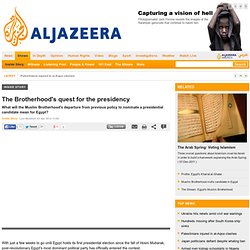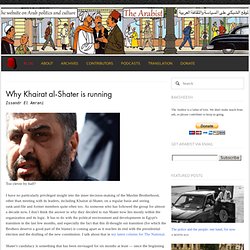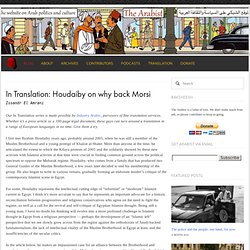

The Brotherhood's quest for the presidency - Inside Story. With just a few weeks to go until Egypt holds its first presidential election since the fall of Hosni Mubarak, post-revolutionary Egypt's most dominant political party has officially entered the contest.

The Muslim Brotherhood has nominated a presidential candidate - in a major reversal of its previous policy. Khairat al-Shater is the group's deputy leader and a millionaire businessman who was imprisoned for 12 years during Mubarak's rule. In February, Shater denied the possibility of running as a candidate for the Freedom and Justice Party, the Muslim Brotherhood's political wing, saying: "We will not nominate a candidate from the Muslim Brotherhood, we'll announce who we will support just before nominations close. " But on Saturday, the Brotherhood said the military had blocked their attempts to dismiss the cabinet and threatened to dissolve the newly-elected parliament, as well as attempting to push forward a candidate from the old regime. Why Khairat al-Shater is running. Too clever by half?

I have no particularly privileged insight into the inner decision-making of the Muslim Brotherhood, other than meeting with its leaders, including Khairat al-Shater, on a regular basis and seeing rank-and-file and former members quite often too. As someone who has followed the group for almost a decade now, I don't think the answer to why they decided to run Shater now lies mostly within the organization and its logic. It has to do with the political environment and developments in Egypt's transition in the last few months, and especially the fact that this ill-thought out transition (for which the Brothers deserve a good part of the blame) is coming apart as it reaches its end with the presidential election and the drafting of the new constitution.
I talk about that in my latest column for The National. Shater's candidacy is something that has been envisaged for six months at least — since the beginning of the end of the entente cordiale between the MB and SCAF. In Translation: Houdaiby on why back Morsi. Our In Translation series is made possible by Industry Arabic, purveyors of fine translation services.

Whether it’s a press article or a 100-page legal document, these guys can turn around a translation in a range of European languages in no time. Give them a try. I first met Ibrahim Houdaiby years ago, probably around 2005, when he was still a member of the Muslim Brotherhood and a young protégé of Khairat al-Shater. More than anyone at the time, he articulated the extent to which the Kifaya protests of 2005 and the solidarity showed by these new activists with Islamist activists at that time were crucial in finding common ground across the political spectrum to oppose the Mubarak regime.
Houdaiby, who comes from a family that has produced two General Guides of the Muslim Brotherhood, a few years later decided to end his membership of the group. For some, Houdaiby represents the intellectual cutting edge of “reformist” or “moderate” Islamist current in Egypt.